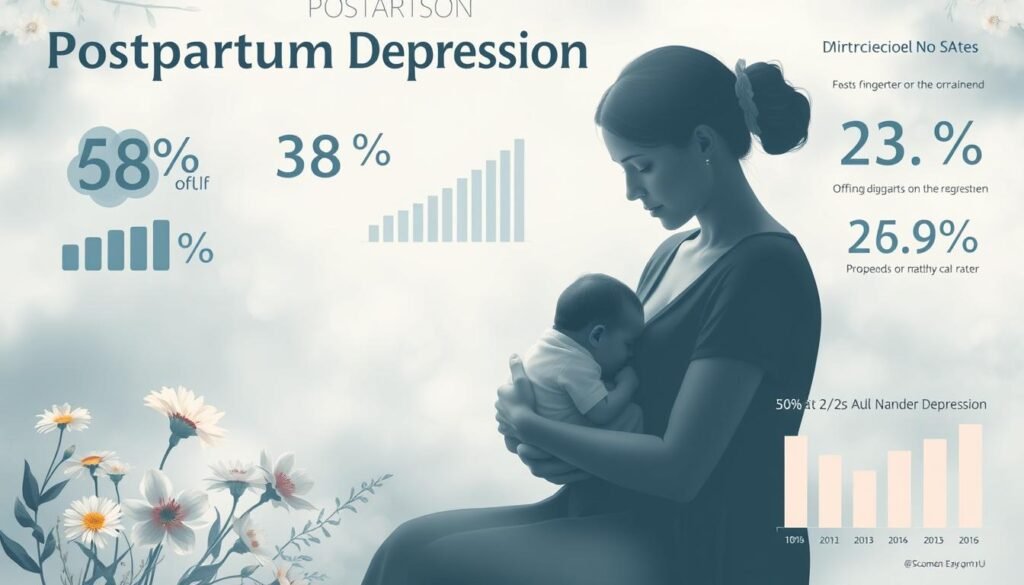Did you know up to 80% of new parents feel “baby blues”? It’s common but can become severe, affecting 1 in 8 with postpartum depression (PPD). Knowing about this is key for both awareness and support.
For many new moms, postpartum depression is a big challenge. It shows up as symptoms that may last weeks or months. This makes it crucial for moms to get help. In this article, we explore postpartum depression. Our goal is to help new moms use this knowledge and resources wisely. Through raising mental health awareness, we aim to support new parents and improve maternal health.
Key Takeaways
- Postpartum Depression affects about 1 in 7 new moms.
- Baby blues impact 50% to 75% of people after birth.
- Symptoms of Postpartum Depression can last up to a year post-birth.
- PPD risk factors include depression history and little social support.
- Around 50% of PPD cases are not diagnosed due to stigma.
- Talk therapy and support groups are effective treatment methods.
- It’s vital to talk openly with healthcare providers about maternal mental health.
Understanding Postpartum Depression
Postpartum Depression (PPD) is a big mood disorder. It can hit anyone who has recently had a baby. This includes moms who have adopted or were surrogates. 1 in 7 women may suffer from this, so knowing what it is, is crucial. It might start soon after the baby arrives or up to a year later. It deeply affects a woman’s feelings during a key stage of her life.
Definition and Overview
PPD means feeling very sad, having extreme mood changes, and feeling alone. These feelings can last more than two weeks. They might make bonding with the baby tough, adding stress to becoming a new parent. It usually starts in the first few weeks after the baby is born. Getting help early is key to avoid more serious issues and help a mom’s mental health.
Common Symptoms and Emotional Impact
The emotional toll of PPD can cause more than just feeling sad. It might lead to difficulty connecting with the baby, lower self-esteem, and being very tired. These problems hurt a mom’s physical and mental health. If a mom has five or more symptoms for over two weeks, she needs to see a doctor. Without treatment, PPD doesn’t only hurt the mom. It can also impact the baby’s growth and actions. Doctors can spot PPD early and suggest ways to treat it.
| Symptom | Description |
|---|---|
| Sadness | Feelings of hopelessness lasting more than two weeks. |
| Fatigue | Severe tiredness that does not improve with rest. |
| Irritability | Increased anger or frustration in daily situations. |
| Anxiety | Persistent worry or panic feelings about motherhood or life. |
| Difficulty Bonding | Struggles in forming an emotional connection with the baby. |
Getting better involves support and different forms of help. Spotting symptoms early and talking to doctors can create a better situation for mom and baby.
For detailed info on postpartum depression and its effects, visit this site.
The Difference Between Baby Blues and Postpartum Depression
It’s key to understand the emotional ups and downs new parents go through. Many feel mood changes after having a baby. Knowing the difference between Baby Blues and Postpartum Depression is vital. It helps in getting the right support and care. Baby Blues and Postpartum Depression affect mood, but they’re not the same. Their impact and how long they last differ a lot.
What Are Baby Blues?
Baby Blues are common, affecting 70-80% of new moms right after birth. This period is marked by emotional ups and downs. Moms might feel moody, irritable, and tearful. This usually ends two weeks post-delivery without needing professional help. Hormones changing after the baby is born cause these short-term blues. Not getting enough sleep and big life changes can make them feel worse. With help from loved ones, most parents get through this phase well.
Recognizing the Signs of Postpartum Depression
Postpartum Depression is more intense and lasts longer, impacting about 13% of new mothers. This includes extended periods of sadness, feeling guilty, anxious, and extreme tiredness. These feelings are strong enough to interfere with day-to-day life and caring for the baby. If these symptoms don’t improve after two weeks or get worse, it’s critical to get help. Noticing signs early is key to getting necessary support.
Both dads and partners can also face Postpartum Depression. This shows how important it is for families to talk and support each other during tough times.
| Condition | Duration | Symptoms | Need for Treatment |
|---|---|---|---|
| Baby Blues | Up to 2 weeks | Mood swings, irritability, weepiness | No |
| Postpartum Depression | Months to years | Prolonged sadness, guilt, anxiety, lethargy | Yes |
Building a support network is crucial in dealing with both Baby Blues and Postpartum Depression. Talking to friends, family, or doctors is an important step toward getting better. Sharing your journey helps in finding ways to cope. It’s beneficial for parents dealing with these emotional challenges.
Who Is Affected by Postpartum Depression?
Postpartum depression touches many, showing clear patterns among new parents. Spotting these patterns helps in quick help and support. Knowing about Postpartum Depression Statistics is vital for raising awareness.
Statistics and Prevalence
Studies reveal diverse experiences in maternal mental health among new parents. Almost 80% feel down, stressed, or irritable after having a baby. Depression rates after birth are seen in about 6.5% to 20% of new parents.
Besides depression, about 10% suffer from postpartum anxiety. Here’s a quick look at the stats:
| Condition | Prevalence |
|---|---|
| Postpartum Depression | 6.5% – 20% |
| Postpartum Anxiety Disorder | 10% |
| Postpartum OCD | 1.7% – 7% |
| Postpartum Panic Disorder | Up to 10% |
| PTSD Postpartum | 9% |
| Postpartum Psychosis | 1 – 2 per 1,000 births |
| Fathers Affected | 8% – 13% |
Risk Factors for New Moms
Spotting risk factors for PPD can change prevention and treatment. Major risks include:
- Personal or family history of mood problems.
- Past depression during pregnancies.
- Lack of social support from loved ones.
- Trouble during pregnancy or hard childbirth.
- Going through a traumatic birth.
Knowing these Risk Factors for PPD helps pros and families support new moms. This leads to improved Maternal Mental Health.

How Hormonal Changes Contribute to Postpartum Depression
After giving birth, a woman’s body goes through major changes. One big change is in her hormones. These shifts can really affect how she feels emotionally. The big drop in hormones like estrogen and progesterone can lead to feeling depressed. It’s important to understand these changes to get why postpartum depression happens.
Understanding Hormonal Shifts After Birth
Right after having a baby, a woman’s hormone levels change a lot. Research shows that these shifts might relate to postpartum depression, but it’s not clear-cut. Not all studies link hormone levels directly to depression severity. Yet, some treatments using hormones like estradiol help with depression, showing it’s complex.
The Role of Genetics and Environment
Genetics play a role in postpartum depression too. If a woman has a personal or family history of depression, her risk might be higher. Plus, things in her environment matter a lot. Stuff like not having enough support, bad relationships, and stress can make depression more likely. Studies suggest that these social and emotional factors are more important than hormone changes for predicting postpartum depression.
| Influencing Factors | Impact on PPD |
|---|---|
| Hormonal Changes Postpartum | Influences mood stability but less predictive of PPD symptoms. |
| Genetic Predisposition | Increased risk for those with a family history of depression. |
| Environmental Factors | Decreased social support and life stressors heighten risk. |
| Treatment Interventions | Estradiol has been effective for some in reducing symptoms. |
Recognizing the Need for Support
It’s crucial for new moms with postpartum depression to seek help. Acknowledging feelings can lead to better health outcomes. It’s essential to talk with healthcare providers early on. This can help spot and manage symptoms of depression quickly. About one in seven women face postpartum depression, highlighting the importance of addressing this issue.
Importance of Open Communication with Healthcare Providers
Talking openly with doctors about mental health can greatly help new moms. Doctors now often check for depression in new moms. This can lead to faster help. Spotting symptoms like sadness or anxiety early allows for better treatment planning.
Building a Support System with Family and Friends
Having strong support is key to recovery. Friends and family can offer emotional and practical support. Over 300 women have shared how vital social ties are. Peers who understand the stress of motherhood can offer comfort and motivation.

Moms benefit from joining support groups or online communities. Sharing experiences with those in similar situations helps. Every step taken to build support reduces loneliness and builds resilience. Effective communication with healthcare providers and a good support network are crucial for recovery.
Treatment Options for Postpartum Depression
It’s critical for new mothers with postpartum depression to find the right treatments. They have options like psychotherapy, medication, and joining support groups. These methods help mothers deal with the tough times they’re going through.
Therapeutic Approaches: Psychotherapy and Support Groups
Psychotherapy plays a vital role in healing for new moms. Techniques like cognitive-behavioral therapy (CBT) are really effective against postpartum depression symptoms. Besides, support groups are great because they let moms connect with others who understand what they’re facing.
Medication Options: Safety During Breastfeeding
Medication is key in treating postpartum depression. The FDA has approved a new oral treatment called Zurzuvae (zuranolone). It’s a big step forward. Before this, treatments like Brexanolone (Zulresso) were given through IV and needed a stay in a medical facility.
Most antidepressants are safe to use while breastfeeding, so babies are safe. Recent research brings hope for oral treatments, making it easier and more comfortable for new moms.

| Treatment Option | Description | Notes |
|---|---|---|
| Zurzuvae (zuranolone) | First oral medication approved for PPD. | Taken once daily for 14 days with a fatty meal. |
| Brexanolone (Zulresso) | IV medication requiring a 60-hour monitoring stay. | Administered in a healthcare facility. |
| Support Groups | Facilitates emotional support among mothers. | Encourages sharing and coping strategies. |
| Psychotherapy | Cognitive-behavioral therapy tailored for PPD. | Effective for addressing negative thought patterns. |
Combining these treatments can really help new moms feel better. It’s important to seek help early. This helps with bonding with their baby and adjusting to motherhood in a healthy way.
Self-Care Strategies for New Moms
For new moms facing the hard times of postpartum depression (PPD), having a self-care plan is vital. Doing things that make you feel good emotionally and physically really helps with recovery. Mindfulness, especially, gives you ways to handle stress and get better mentally.
Practicing Mindfulness and Stress Relief Techniques
Mindful methods, such as meditating and deep breathing, bring calm to new moms. These Mindfulness Techniques help moms be in the moment with their feelings, cutting down on stress and overwhelm. Doing these often can make moms feel more in control and kinder towards themselves.
The Benefits of Physical Activity and Nutrition
Exercise is key for improving mood and energy. It releases endorphins, which make us feel happier. Eating well is just as important, with a focus on foods that boost mental health. Moms should eat lots of fruits, veggies, grains, and lean meats. These steps are good for both moms and their babies.
To learn more about self-care, new moms can check out self-care tips specially created for postpartum.
Maternal Support Resources
Finding the right help can make a big difference for those dealing with postpartum depression. Many organizations are ready to help, offering needed support and advice. These Resources for PPD empower new moms, helping them feel understood during these tough times.
National Maternal Mental Health Hotline
The National Maternal Mental Health Hotline (1-833-TLC-MAMA) is here to help, day or night, in over 60 languages. It’s a crucial support for mothers needing immediate help with their emotions. The hotline also connects mothers to Maternal Support Organizations for more personalized help.
Postpartum Support International
Postpartum Support International (PSI) offers vital help and support groups for those struggling emotionally during and after pregnancy. Reach out at 1-800-944-4PPD. PSI reminds us that postpartum depression can affect many, including those who’ve had miscarriages or stillbirths. Up to 20% of women in the U.S. might experience these feelings, showing the importance of support and understanding. For more on this topic, see this link.
| Resource | Contact Number | Availability |
|---|---|---|
| National Maternal Mental Health Hotline | 1-833-TLC-MAMA | 24/7 |
| National Suicide Prevention Lifeline | 1-800-273-TALK | 24/7 |
| Substance Abuse and Mental Health Services Administration | 1-800-662-HELP | 24/7 |
| Postpartum Support International | 1-800-944-4PPD | 24/7 |
Using these resources can greatly improve mothers’ emotional health. Connecting with Maternal Support Organizations builds a network of support. It benefits mothers and families alike. Knowing the facts about postpartum depression highlights the need for these resources to overcome stigma and help recovery.
Conclusion
Postpartum Depression impacts many new moms, with about 15% experiencing it after childbirth. It often starts within the first month but can show up to 30 weeks later. Symptoms like sadness, anxiety, and tiredness can really affect their day-to-day life.
It’s key for moms to tackle Postpartum Challenges head-on. Taking early steps can help improve their mental health.
Getting support is vital for new moms. They might deal with things like past depression or not having enough support. Talking openly with doctors and family can create a caring space. This lets moms get help easily. Making a strong support network is key in fighting postpartum depression.
Also, self-care and professional treatments such as psychotherapy and medication are crucial for healing. Focusing on mental health and self-care helps new moms get through motherhood stronger and happier.